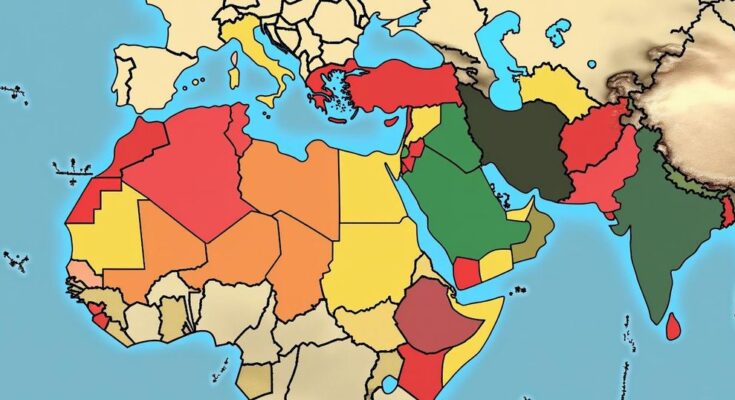Egypt is enhancing its regional presence in the Horn of Africa by forming alliances with Somalia and Eritrea, as signified by President Abdel Fattah Al-Sisi’s participation in a summit aimed at fostering cooperation and potentially countering Ethiopian influence. This comes amidst heightened tensions over military engagements in Sudan and Ethiopia’s growing military agreements with Somaliland.
Egypt is reinforcing its influence in the Horn of Africa through strategic alliances with Somalia and Eritrea, evidenced by the participation of President Abdel Fattah Al-Sisi in a recent tripartite summit in Asmara. This summit, attended by Eritrean President Isaias Afwerki and Somali President Hassan Sheikh Mohamud, is also perceived as a move to establish a unified front against Ethiopia. This development occurs amidst increasing tensions in the region, especially following allegations by Sudanese Rapid Support Forces’ commander, Mohamed Hamdan Dagalo, who accused Egypt of military intervention in the ongoing conflict in Sudan. Egypt appears to have shifted from a neutral stance to direct involvement, signaling its commitment to safeguard its regional interests. The Eritrean government framed the summit’s objective around enhancing bilateral relations and addressing regional security; however, speculations suggest the primary focus may be the creation of an alliance aimed at countering Ethiopia’s influence, particularly following Ethiopia’s recent military agreements with Somaliland. The Egyptian presidency emphasized the importance of this summit for advancing cooperation across various sectors and promoting stability in the region. Ethiopian Prime Minister Abiy Ahmed has vocalized opposition to Egypt’s growing connections in the Horn of Africa, stating, “We will not allow them to harm us, we will humiliate anyone who dares to threaten us to deter them,” reinforcing Ethiopia’s resolve to maintain its sovereignty. Egypt’s choice to engage more decisively in African crises, such as its support for Sudan’s military leader Abdel Fattah al-Burhan while participating in diplomatic efforts to resolve the conflict, demonstrates Cairo’s desire to position itself as a pivotal player on the continent. The accusations of Egypt using U.S. weaponry in the Sudan conflict have been met with denials from Cairo, which insists on its commitment to Sudan’s stability and the integrity of its institutions. Egypt’s former deputy foreign minister, Ambassador Hussein Haridi, asserted that the nation strives to end the war in Sudan, foreseeing severe repercussions should the conflict persist.
The Horn of Africa has historically been a region marked by strategic geopolitical interests, particularly concerning the relationships among Egypt, Ethiopia, and the surrounding nations. Egypt’s involvement in this region has often related to its need to secure access to vital water resources like the Nile, alongside its ambitions to assert influence over neighboring states. The recent political dynamics, highlighted by military conflicts in Sudan and Ethiopia, have opened avenues for Egypt to forge alliances with Somalia and Eritrea, potentially restructuring power balances in the region.
In conclusion, Egypt’s strengthening of alliances with Somalia and Eritrea reflects its strategic maneuvering in the Horn of Africa amidst rising tensions with Ethiopia over influence and regional stability. President Al-Sisi’s involvement in the tripartite summit signifies a decisive shift toward active participation in regional conflicts, further complicating the geopolitical landscape. With Ethiopia expressing its intent to preserve sovereignty against perceived threats, the evolving situation underscores the intricate balances of power in this critical area of Africa.
Original Source: www.atalayar.com




